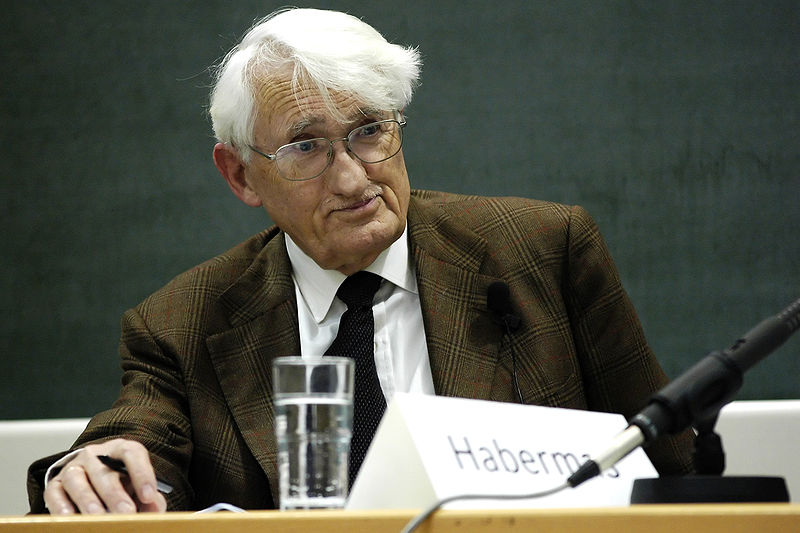<Back to Index>
- Sociologist and Philosopher Jürgen Habermas, 1929
- Architect Bartolomeo Ammanati, 1511
- Prime Minister of France Édouard Daladier, 1884


Jürgen Habermas (born June 18, 1929) is a German sociologist and philosopher in the tradition of critical theory and pragmatism. He is perhaps best known for his work on the concept of the public sphere, the topic of his first book entitled The Structural Transformation of the Public Sphere. His work focuses on the foundations of social theory and epistemology, the analysis of advanced capitalistic societies and democracy, the rule of law in a critical social-evolutionary context, and contemporary politics — particularly German politics. Habermas's theoretical system is devoted to revealing the possibility of reason, emancipation, and rational-critical communication latent in modern institutions and in the human capacity to deliberate and pursue rational interests. Habermas is known for his work on the concept of modernity, particularly with respect to the discussions of "rationalization" originally set forth by Max Weber.
Born in Düsseldorf, North Rhine-Westphalia, in 1929, to a middle class and rather traditional family, Habermas came of age in postwar Germany. In his early teens, during World War II, Habermas was profoundly affected by the war. The Nuremberg Trials were a key formative moment that brought home to him the depth of Germany's moral and political failure under National Socialism. Until his graduation from gymnasium, Habermas lived in Gummersbach, near Cologne. His father, Ernst Habermas, was executive director of the Cologne Chamber of Industry and Commerce, and was described by Habermas as a Nazi sympathizer. He was brought up in a staunchly Protestant milieu, his grandfather being the director of the seminary in Gummersbach. He studied at the universities of Göttingen (1949/50), Zürich (1950/51), and Bonn (1951–54) and earned a doctorate in philosophy from Bonn in 1954 with a dissertation written on the conflict between the absolute and history in Schelling's thought, entitled, Das Absolute und die Geschichte. Von der Zwiespältigkeit in Schellings Denken ("The absolute and history: on the schism in Schelling's thought"). His dissertation committee included Erich Rothacker and Oskar Becker.
From 1956 on, he studied philosophy and sociology under the critical theorists Max Horkheimer and Theodor Adorno at the Johann Wolfgang Goethe University Frankfurt am Main Institute for Social Research, but because of a rift between the two over his dissertation — Horkheimer had made unacceptable demands for revision — as well as his own belief that the Frankfurt School had become paralyzed with political skepticism and disdain for modern culture — he finished his habilitation in political science at the University of Marburg under the Marxist Wolfgang Abendroth. His habilitation work was entitled, Strukturwandel der Öffentlichkeit; Untersuchungen zu einer Kategorie der Bürgerlichen Gesellschaft (published in English translation in 1989 as The Structural Transformation of the Public Sphere: an Inquiry into a Category of Bourgeois Society). In 1961, he became a privatdozent in Marburg, and — in a move that was highly unusual for the German academic scene of that time — he was offered the position of "extraordinary professor" (professor without chair) of philosophy at the University of Heidelberg (at the instigation of Hans-Georg Gadamer and Karl Löwith) in 1962, which he accepted. In this same year he gained his first serious public attention, in Germany, with the publication of his habilitation, Strukturwandel der Offentlichkeit (Structural Transformation of the Public Sphere; English ed., 1989), a detailed social history of the development of the bourgeois public sphere from its origins in the 18th century salons up to its transformation through the influence of capital-driven mass media. In 1964, strongly supported by Adorno, Habermas returned to Frankfurt to take over Horkheimer's chair in philosophy and sociology. The philosopher Albrecht Wellmer was his assistant in Frankfurt from 1966 to 1970. He accepted the position of Director of the Max Planck Institute in Starnberg (near Munich) in 1971, and worked there until 1983, two years after the publication of his magnum opus, The Theory of Communicative Action.
Habermas then returned to his chair at Frankfurt and the directorship of the Institute for Social Research. Since retiring from Frankfurt in 1993, Habermas has continued to publish extensively. In 1986, he received the Gottfried Wilhelm Leibniz Prize of the Deutsche Forschungsgemeinschaft, which is the highest honour awarded in German research. He also holds the uncharacteristically postmodern position of "Permanent Visiting" Professor at Northwestern University in Evanston, Illinois, and "Theodor Heuss Professor" at The New School, New York.
Habermas was awarded The Prince of Asturias Award in Social Sciences of 2003. Habermas was also the 2004 Kyoto Laureate in the Arts and Philosophy section. He traveled to San Diego and on March 5, 2005, as part of the University of San Diego's Kyoto Symposium, gave a speech entitled The Public Role of Religion in Secular Context, regarding the evolution of separation of Church and State from neutrality to intense secularism. He received the 2005 Holberg International Memorial Prize (about € 520,000).
Habermas is a famed teacher and mentor. Among his most prominent students were the pragmatic philosopher Herbert Schnädelbach (theorist of discourse distinction and rationality), the political sociologist Claus Offe (professor at the Hertie School of Governance in Berlin), the social philosopher Johann Arnason (professor at La Trobe University and chief editor of the journal Thesis Eleven), the sociological theorist Hans Joas (professor at the University of Erfurt and at the University of Chicago), the theorist of societal evolution Klaus Eder, the social philosopher Axel Honneth (the current director of the Institute for Social Research), the anarcho-capitalist philosopher Hans-Hermann Hoppe, the American philosopher Thomas McCarthy, the co-creator of mindful inquiry in social research Jeremy J. Shapiro, and the assassinated Serbian prime minister Zoran Đinđić. Habermas has constructed a comprehensive framework of social theory and philosophy drawing on a number of intellectual traditions: Jürgen Habermas considers his major contribution to be the development of the concept and theory of communicative reason or communicative rationality, which distinguishes itself from the rationalist tradition by locating rationality in structures of interpersonal linguistic communication rather than in the structure of either the cosmos or the knowing subject. This social theory advances the goals of human emancipation, while maintaining an inclusive universalist moral framework. This framework rests on the argument called universal pragmatics - that all speech acts have an inherent telos (the Greek word for "end") — the goal of mutual understanding,
and that human beings possess the communicative competence to bring
about such understanding. Habermas built the framework out of the speech-act philosophy of Ludwig Wittgenstein, J.L. Austin, and John Searle, the sociological theory of the interactional constitution of mind and self of George Herbert Mead, the theories of moral development of Jean Piaget and Lawrence Kohlberg, and the discourse ethics of his Heidelberg colleague Karl-Otto Apel. Habermas's works resonate within the traditions of Kant and the Enlightenment and of democratic socialism through
his emphasis on the potential for transforming the world and arriving
at a more humane, just, and egalitarian society through the realization
of the human potential for reason, in part through discourse ethics.
While Habermas has stated that the Enlightenment is an "unfinished
project," he argues it should be corrected and complemented, not
discarded. In this he distances himself from the Frankfurt School,
criticizing it, as well as much of postmodernist thought, for excessive pessimism, misdirected radicalism and exaggerations. Within sociology, Habermas's major contribution was the development of a comprehensive theory of societal evolution and modernization focusing on the difference between communicative rationality and rationalization on the one hand and strategic/instrumental rationality and rationalization on the other. This includes a critique from a communicative standpoint of the differentiation-based theory of social systems developed by Niklas Luhmann, a student of Talcott Parsons. His defence of modernity and civil society has been a source of inspiration to others, and is considered a major philosophical alternative to the varieties of post structuralism. He has also offered an influential analysis of late capitalism. Habermas perceives the rationalization, humanization, and democratization of society in terms of the institutionalization of the potential for rationality that is inherent in the communicative competence that is unique to the human species. Habermas contends that communicative competence has developed through the course of evolution, but in contemporary society it is often suppressed or weakened by the way in which major domains of social life, such as the market, the state, and organizations,
have been given over to or taken over by strategic/instrumental
rationality, so that the logic of the system supplants that of the lifeworld.